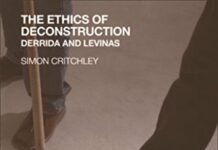
Ebook Info
- Published: 1996
- Number of pages: 100 pages
- Format: PDF
- File Size: 1.13 MB
- Authors: Simon Critchley
Description
Deconstruction and pragmatism constitute two of the major intellectual influences on the contemporary theoretical scene; influences personified in the work of Jacques Derrida and Richard Rorty. Both Rortian pragmatism, which draws the consequences of post-war developments in Anglo-American philosophy, and Derridian deconstruction, which extends and troubles the phonomenological and Heideggerian influence on the Continental tradition, have hitherto generally been viewed as mutually exclusive philosophical language games.The purpose of this volume is to bring deconstruction and pragmatism into critical confrontation with one another through staging a debate between Derrida and Rorty, itself based on discussions that took place at the College International de Philosophie in Paris in 1993. The ground for this debate is layed out in introductory papers by Simon Critchley and Ernesto Laclau, and the remainder of the volume records Derrida’s and Rorty’s responses to each other’s work. Chantal Mouffe gives an overview of the stakes of this debate in a helpful preface.
User’s Reviews
Editorial Reviews: Review “Chantal Mouffe should be commended for her work in putting this excellent collection of essays together. It offers a serious challenge to rationalist conceptions of democracy and also gives readers a good idea of the conflicts and convergences between the deconstructionist and pragmatist approaches to politics.”-“American Catholic Philosophical Quarterly “In recent years there have been some striking convergences between Pragmatism and Deconstruction. But there are also significant ways in which these philosophical orientations swerve away from each other and seem incommensurable. Chantal Mouffe’s lucid introduction sets the stage for a lively exchange between Richard Rorty and Jacques Derrida. Their crossfire is enriched by the contributions of Simon Critchley and Ernest Laclau. Altogether a splendid and illuminating feast of agnostic debate.”-Richard J. Bernstein, Vera List Professor of Philosophy, Graduate Faculty, New School for Social Research From the Back Cover Derridean deconstruction and Rortian pragmatism are both accused by their enemies of undermining our ideas of truth and reason, but do their ideas lead to intellectual and political chaos? Both are committed to the democratic project but they reject the necessary link between universalism, rationalism and modern democracy and seek to clarify what is at stake intellectually and politically. About the Author Chantal Mouffe is a Senior Research Fellow at acknowledgement Centre for the Study of Democracy at the University of Westminster. Read more
Reviews from Amazon users which were colected at the time this book was published on the website:
⭐The introductory section of this 1996 book states, “Is pragmatism deconstructive? Is deconstruction pragmatic? These questions are levelled at two of the most prominent thinkers of our time. Richard Rorty and Jacques Derrida are brought together in this collection in dialogue to discuss their respective positions… This book is the record of a symposium to discuss, amongst other things, how Derrida’s deconstruction and Rorty’s pragmatism could contribute to a non-foundational theory of democracy. Apart from Derrida and Rorty, two other eminent theorists took part in the discussion… They brought forward the points of convergence as well as the differences in both approaches and examined their political relevance.”Rorty states, “Whereas [Derrida’s] Anglophone followers typically read books like [On Grammatology] as demonstrating philosophical, transcendental truths, I see them as propadeutic [preparatory study or instruction]. Derrida’s earlier, less idiosyncratic, more ‘strictly philosophical’ work—and in particular his works on Husserl—were necessary to get him a hearing, necessary to establish himself and get himself published. But, although I find these works very valuable, I do not read them as ‘contributions to philosophy,’ in the sense of books that demonstrate, now and forever, certain theses. I read them as books in which Derrida works out his private relationships to the figures who have meant most to him. I prefer texts like ‘Envois’ and ‘Circonfession’ because they seem to me more vivid and forceful forms of private self-creation than is possible through the explication of texts, even when this explication is exceptionally brilliant and original.” (Pg. 16-17)Rorty later admits, “I agree with Simon Critchley that I have, in the past, made too much of the difference between earlier and later Derrida, and that ‘the closer one looks, the harder it is to find any substantial difference between earlier and later work’. The more one reads Heidegger or Derrida, the more continuities between the earlier and later writings appear. But I should still claim that just as all that programmatic throat-clearing stuff about ‘phenomenal ontology’ at the beginning of ‘Being and Time’ was something which Heidegger would have done better to have edited out, so all that supposedly deep stuff about the primordiality of the trace in Derrida’s earlier work looks like a young philosophy professor, still a bit unsure of himself, making quasi-professional noises.” (Pg. 41)He continues, “One difference between Derrideans like Critchley and Deweyans like myself is that Derrida likes to put things in question, whereas Dewey insisted on asking, ‘What’s the problem?’ Our attitude is: if it isn’t broken, don’t fix it. Keep on using it until you can think of some other sort of tool which might do the job better. Derrideans tend to think that that the more questioning, problematizing … you can squeeze into the day’s work, the better. Deweyans, on the other hand, think that you should only question when you find yourself in what Dewey called a ‘problematic situation’—a situation in which you are no longer sure of what you are doing.” (Pg. 44)Derrida begins his essay, “First, I would like to say, even if this shocks certain among you and even if I myself took my head in my hands when Richard Rorty said that I was sentimental and that I believed in happiness, I think that he’s right. This is something very complicated that I would like to come back to later, but I am very grateful to Richard Rorty for having dared to say something very close to my heart and which is essential to what I am trying to do. Even if it appears very provocative to say it and even if I began by protesting, I think that I was wrong. I am very sentimental and I believe in happiness, and I believe that this has an altogether determinant place in my work.” (Pg. 77)He continues, “I obviously cannot accept the public/private distinction in the way [Rorty] uses it in relation to my work…I have tried to withdraw a dimension of experience … from the public or political sphere… I would not call this private. In other words, for me the private is not defined by the singular (I do not say personal, because I find this a slightly confused notion) or the secret. In so far as I try to thematize a dimension of the secret that is absolutely irreducible to the public, I also resist the application of the public/private distinction to this dimension… It would not only have been impossible to publish ‘Glas’ without [Of Grammatology], but it would have been impossible to write Glas without the early work. It is here a question of an irreversible philosophical —or quasi-philosophical—trajectory.” (Pg. 79)This is an excellent, very insightful exchange between these two thinkers, and the two commentators add valuable commentary as well. It will probably be of most interest to those studying (whether sympathetically, or critically) Derrida, rather than those studying Rorty and Pragmatism.
⭐What I want to say I am certain I will not achieve in the space of an online review. That being said, I think this work was important because in it Derrida admits with qualification to Rorty’s charges that he (Derrida) is sentimental and believes in happiness. This may come as a shock to some Derrideans. Those who use Derrida’s writings and reception to shake and destroy are missing the responsibility issue in the debate. It is unfortunate that deconstruction has been described so often in the popular media as anti-humanist, because now only purblind graduate students read him and I can’t convince any of my friends who are in the practice of yessing life to read and live with him.
⭐These essays come from a conference, and respond to each other. Derrida, as usual, is a bit cheeky. The essays make the most sense if you know some Rorty, but you can muddle through without having read him before. The reason to buy this book, instead of just photocopy one essay, is that the contents really do reference each other. On the other hand, it’s not clear they advance a single argument, or lead to any enlightenment. Buy this book only if you are a grad student expecting to scribble notes all over the margins. Expect it to be one of the books you cart to a thrift store a year later.
⭐
⭐
⭐
⭐
Keywords
Free Download Deconstruction and Pragmatism in PDF format
Deconstruction and Pragmatism PDF Free Download
Download Deconstruction and Pragmatism 1996 PDF Free
Deconstruction and Pragmatism 1996 PDF Free Download
Download Deconstruction and Pragmatism PDF
Free Download Ebook Deconstruction and Pragmatism





